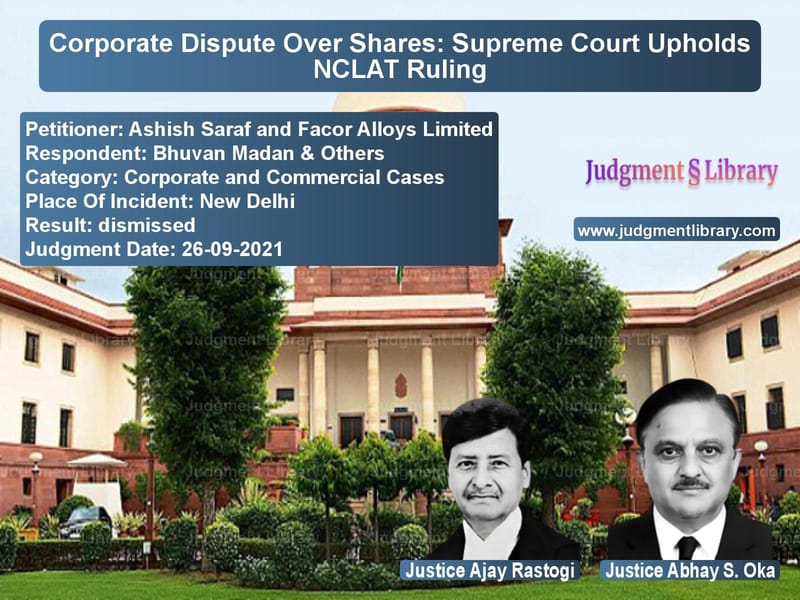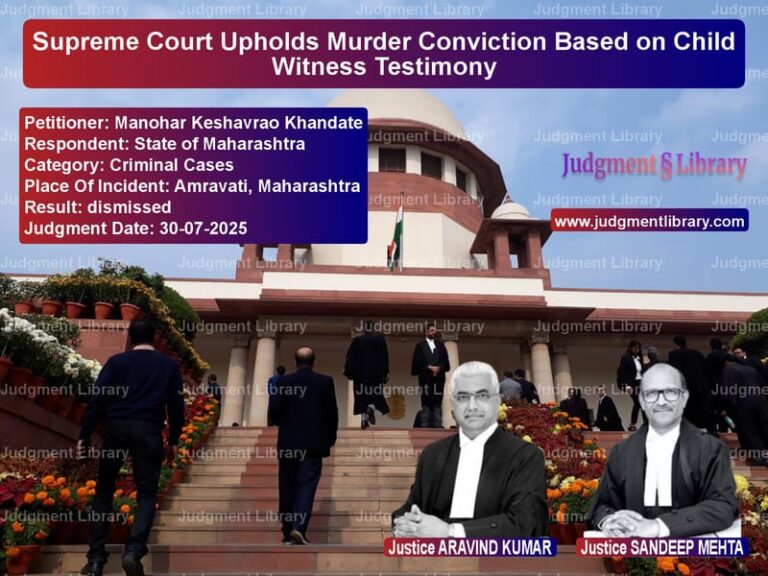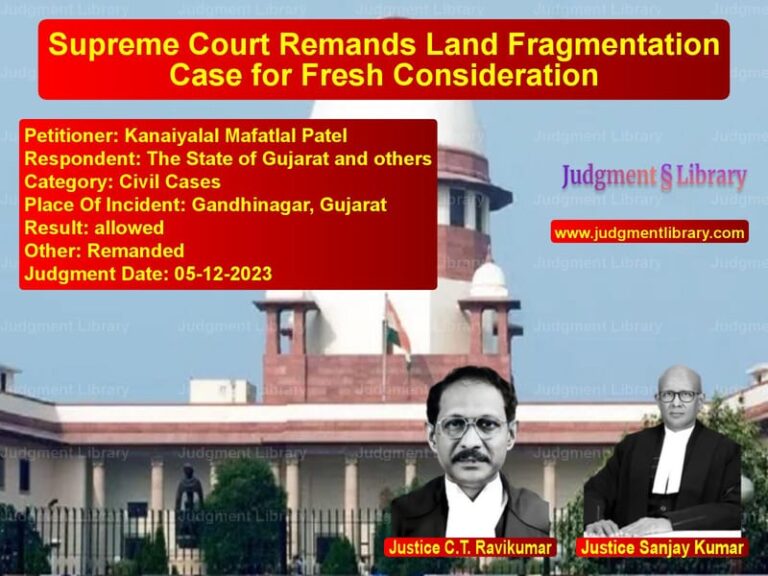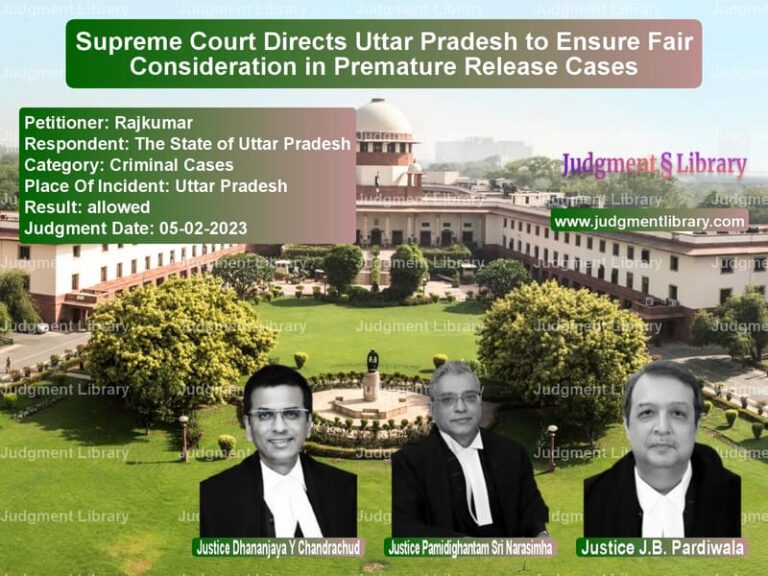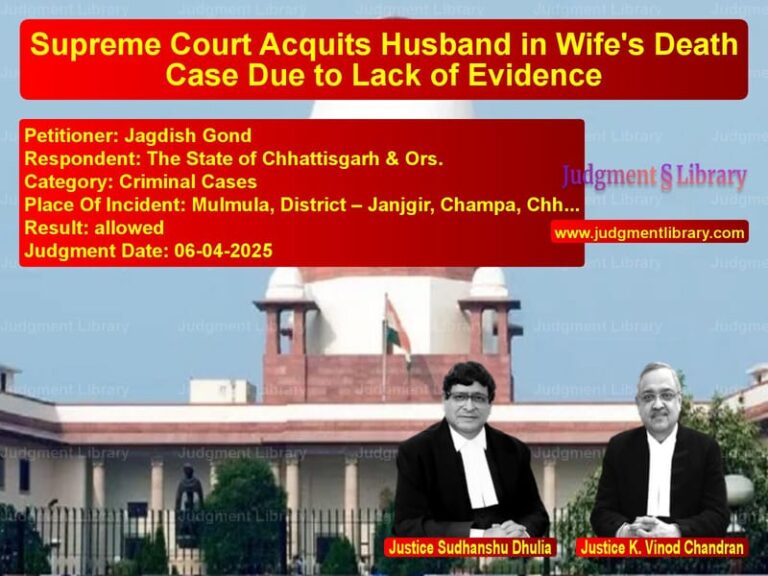Corporate Dispute Over Shares: Supreme Court Upholds NCLAT Ruling
The case of Ashish Saraf v. Bhuvan Madan & Ors. and Facor Alloys Limited v. Bhuvan Madan & Ors. revolves around a corporate dispute concerning shareholding rights and company management. The Supreme Court was called upon to determine whether it should interfere with the decision of the National Company Law Appellate Tribunal (NCLAT), which had upheld the earlier ruling by the National Company Law Tribunal (NCLT). Ultimately, the Supreme Court declined to interfere, thereby affirming the NCLAT’s decision.
Background of the Case
The dispute arose in the context of corporate governance and shareholder rights in Facor Alloys Limited. The case involved multiple appeals before the NCLT and subsequently the NCLAT, leading to the final appeal before the Supreme Court.
The key aspects of the case were:
- A conflict over the management and ownership of Facor Alloys Limited.
- Allegations of oppression and mismanagement against the controlling shareholders.
- Multiple proceedings before the NCLT and NCLAT before reaching the Supreme Court.
On March 12, 2020, the NCLAT delivered its judgment, which was later challenged in the Supreme Court through Civil Appeal Diary No. 2669/2021 and Civil Appeal No. 5129/2021. The Supreme Court heard arguments at length before delivering its final ruling.
Read also: https://judgmentlibrary.com/tenant-rights-vs-secured-creditors-supreme-court-rules-on-sarfaesi-act/
Key Legal Issues
The Supreme Court had to determine:
- Whether the NCLAT had correctly applied the provisions of the Companies Act in its ruling.
- Whether the allegations of oppression and mismanagement warranted interference by the Supreme Court.
- Whether the Supreme Court should intervene in the corporate dispute, given the findings of the lower tribunals.
Petitioner’s Arguments (Ashish Saraf and Facor Alloys Limited)
The appellants, represented by legal counsel, argued:
- The NCLAT had failed to appreciate the factual and legal complexities of the case.
- The ruling by the NCLT and NCLAT adversely affected their rights as shareholders.
- The Supreme Court should intervene to correct the alleged errors made by the lower tribunals.
Respondent’s Arguments (Bhuvan Madan & Others)
The respondents countered:
- The NCLAT had correctly applied the law and there was no need for further interference.
- The corporate dispute had been resolved appropriately under the provisions of the Companies Act.
- The Supreme Court should not entertain appeals seeking to re-examine settled findings.
Supreme Court’s Observations
After hearing the arguments, the Supreme Court made the following key observations:
- The NCLAT had examined the case in detail and had ruled in accordance with the law.
- There was no apparent error or legal infirmity in the NCLAT’s decision that warranted interference.
- Corporate disputes of this nature should be resolved within the framework of the Companies Act and the mechanisms provided therein.
Supreme Court’s Judgment
The Supreme Court ruled in favor of the respondents, holding that:
- The appeals lacked merit and did not justify the Court’s interference.
- The NCLAT’s judgment was upheld, and the appeals were dismissed.
- No further relief would be granted to the appellants.
Key Takeaways from the Judgment
- NCLAT Decisions Carry Weight: The Supreme Court reaffirmed that the NCLAT’s rulings should not be disturbed unless there is a clear legal error.
- Corporate Disputes Should Follow Legal Framework: Shareholders must resolve conflicts through the legal mechanisms provided under the Companies Act.
- Supreme Court Avoids Unnecessary Intervention: The ruling confirms that the Supreme Court will not interfere in every corporate dispute unless a substantial question of law arises.
- Tribunal Findings Are Binding: The judgment underscores the importance of respecting the conclusions reached by the NCLT and NCLAT.
- Corporate Governance Matters Must Follow Due Process: The decision reinforces the need for companies to adhere strictly to the legal process in resolving management and shareholder disputes.
Conclusion
The Supreme Court’s judgment in Ashish Saraf v. Bhuvan Madan & Ors. and Facor Alloys Limited v. Bhuvan Madan & Ors. reinforces the finality of NCLAT decisions and discourages unnecessary litigation in corporate disputes. The ruling underscores the importance of following due process and ensuring that shareholder conflicts are resolved within the existing legal framework.
Petitioner Name: Ashish Saraf and Facor Alloys Limited.Respondent Name: Bhuvan Madan & Others.Judgment By: Justice Ajay Rastogi, Justice Abhay S. Oka.Place Of Incident: New Delhi.Judgment Date: 26-09-2021.
Don’t miss out on the full details! Download the complete judgment in PDF format below and gain valuable insights instantly!
Download Judgment: ashish-saraf-and-fac-vs-bhuvan-madan-&-other-supreme-court-of-india-judgment-dated-26-09-2021.pdf
Directly Download Judgment: Directly download this Judgment
See all petitions in Company Law
See all petitions in Corporate Governance
See all petitions in Shareholder Disputes
See all petitions in Judgment by Ajay Rastogi
See all petitions in Judgment by Abhay S. Oka
See all petitions in dismissed
See all petitions in supreme court of India judgments September 2021
See all petitions in 2021 judgments
See all posts in Corporate and Commercial Cases Category
See all allowed petitions in Corporate and Commercial Cases Category
See all Dismissed petitions in Corporate and Commercial Cases Category
See all partially allowed petitions in Corporate and Commercial Cases Category

